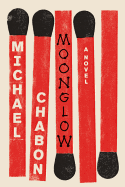
In Moonglow, Pulitzer Prize-winning novelist Michael Chabon (The Amazing Adventures of Kavalier & Clay) takes a beguiling journey along the ever-shifting boundary between truth and fiction in the family stories passed down--or concealed--from one generation to the next.
So many incidents are stuffed into Chabon's novel that it defies easy summary. On one level, it's the episodic account of the narrator conversing for 10 days with his dying maternal grandfather. To describe that life--which included tracking down the document cache of Nazi (and postwar United States) rocket scientist Wernher von Braun and a two-year jail term for assaulting his boss, who fired him to hire accused Soviet spy Alger Hiss in 1957--as colorful is an understatement. But the novel is also the sensitive account of the narrator's maternal grandmother's escape from occupied France as a pregnant teenager, and her lifelong battle with mental illness likely induced by that trauma. Moonglow ultimately succeeds in blending these two narratives because Chabon is so adept at pure storytelling.
With an author's note that refers to the book as a "memoir" and confesses that he has "stuck to facts except when facts refused to conform with memory, narrative purpose, or the truth as I prefer to understand it," Moonglow may leave critics and readers guessing about its provenance. But literary parlor games aside, it's a reminder of the tragic fact that too many engrossing family stories either are not shared with younger generations or, if they are, they're unappreciated by their listeners. Chabon gently reminds readers that we should seek out or pass on those stories before it's too late. --Harvey Freedenberg, attorney and freelance reviewer

